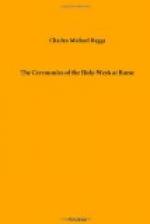[Sidenote: Object of ceremonies.]
But what, it may be asked by many, is the use of ceremonies? I shall answer in the words of the council of Trent. “Since the nature of man is such, that he cannot easily without exterior helps be raised to the meditation of divine things, the church as a pious mother has instituted certain rites, namely, that some things in the mass should be pronounced in a low voice and others aloud; she has also used ceremonies, as mystical benedictions, lights, incense, vestments, and many other things of that kind, from apostolical tradition and discipline, in order that the majesty of so great a sacrifice might be displayed, and the minds of the faithful might be excited by these visible signs of religion and piety to the contemplation of those sublime things which are concealed in this sacrifice”. Session XXII, c. V.—These words lead us to treat briefly of the mass, the principal act of divine worship during holy-week as at all other seasons of the year. This we do now the more readily, that we may not afterwards be obliged to interrupt our account of the peculiar ceremonies of Holy week, which presuppose an acquaintance with the mass.
[Sidenote: Institution of the mass.]
Jesus Christ instituted the mass at his last supper, when he took bread and blessed and broke and gave to his disciples and said, Take ye and eat, this is my body; and taking the chalice he gave thanks, and gave to them saying, Drink ye all of this: For this is my blood of the new testament, which shall be shed for many unto remission of sins: Matth. XXVI, 26. In this brief account are mentioned all the essential parts of the mass. Christ commanded the apostles and through them their successors to perform the same holy rite “in commemoration” of Him, and they obeyed His commands, as we learn from the acts of the apostles, and the first epistle to the Corinthians.
[Sidenote: Its early ceremonies.]
Gradually various prayers and ceremonies were added to the sacred words pronounced by Christ, as the Apology of St. Justin, the writings of St. Cyprian, the catechetical discourses of St. Cyril of Jerusalem and other early works prove. The Apostles themselves had added the Lord’s prayer[3]. The liturgy however during the first four centuries, as Le Brun maintains[4], or, according to Muratori followed by Palmer, the first three centuries, was not written, but was preserved by oral tradition, according to the received practice




